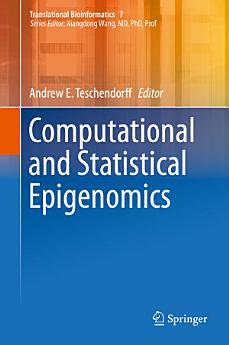Computational and Statistical Epigenomics
Andrew E. Teschendorff
2015年5月 · Translational Bioinformatics 第 7 冊 · Springer
電子書
217
頁數
report評分和評論未經驗證 瞭解詳情
關於這本電子書
This book introduces the reader to modern computational and statistical tools for translational epigenomics research. Over the last decade, epigenomics has emerged as a key area of molecular biology, epidemiology and genome medicine. Epigenomics not only offers us a deeper understanding of fundamental cellular biology, but also provides us with the basis for an improved understanding and management of complex diseases. From novel biomarkers for risk prediction, early detection, diagnosis and prognosis of common diseases, to novel therapeutic strategies, epigenomics is set to play a key role in the personalized medicine of the future. In this book we introduce the reader to some of the most important computational and statistical methods for analyzing epigenomic data, with a special focus on DNA methylation. Topics include normalization, correction for cellular heterogeneity, batch effects, clustering, supervised analysis and integrative methods for systems epigenomics. This book will be of interest to students and researchers in bioinformatics, biostatistics, biologists and clinicians alike.
Dr. Andrew E. Teschendorff is Head of the Computational Systems Genomics Lab at the CAS-MPG Partner Institute for Computational Biology, Shanghai, China, as well as an Honorary Research Fellow at the UCL Cancer Institute, University College London, UK.
為這本電子書評分
請分享你的寶貴意見。
閱讀資訊
智能手機和平板電腦
手提電腦和電腦
你可以使用電腦的網絡瀏覽器聆聽在 Google Play 上購買的有聲書。
電子書閱讀器及其他裝置
如要在 Kobo 等電子墨水裝置上閱覽書籍,你需要下載檔案並傳輸到你的裝置。請按照說明中心的詳細指示,將檔案傳輸到支援的電子書閱讀器。







